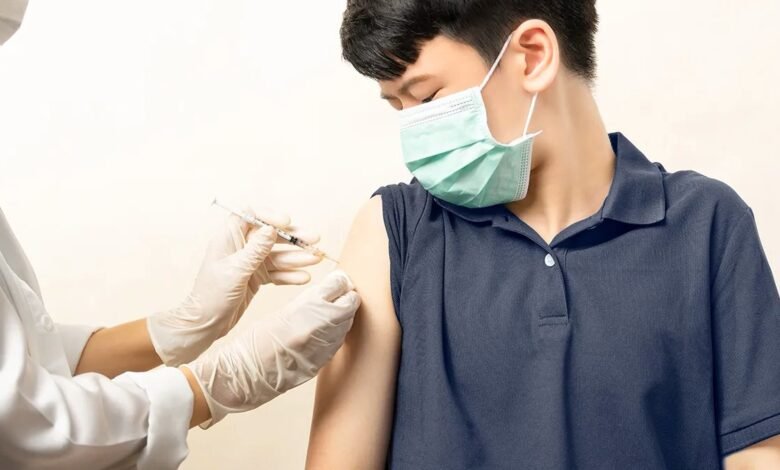Essential Childhood Immunization Guide in 2023

Discover the essential childhood immunization guide in 2023. This comprehensive article covers recommended vaccines, schedules, safety measures, and the importance of immunization. Learn about vaccine-preventable diseases, herd immunity, and future trends in childhood immunization.
Childhood immunization plays a crucial role in safeguarding children’s health and preventing the spread of infectious diseases. In 2023, the significance of immunization remains paramount, and parents and caregivers need to stay informed about the recommended vaccines, schedules, and safety measures. This article serves as a comprehensive guide to childhood immunization, providing valuable information on various aspects related to vaccines and their administration.
Read More: Is My Child Acting Sick Or Sick?
Understanding Childhood Immunization
Childhood immunization refers to the process of administering vaccines to children to protect them from infectious diseases. Vaccines work by stimulating the immune system to produce an immune response, preparing the body to fight off specific diseases. The primary purpose of immunization is to prevent the occurrence, transmission, and complications of vaccine-preventable diseases.
Immunization offers numerous benefits. It significantly reduces the risk of contracting serious illnesses, hospitalizations, and long-term complications. By immunizing children, we can also contribute to the overall community health by preventing the spread of diseases and achieving herd immunity.
Recommended Childhood Vaccines
A range of vaccines are recommended for children to protect them from various diseases. These vaccines include but are not limited to measles, mumps, rubella (MMR), polio, diphtheria, tetanus, pertussis (DTaP), hepatitis B, Haemophilus influenzae type b (Hib), pneumococcal vaccines, and rotavirus vaccines. Each vaccine targets specific pathogens and provides immunity against associated diseases.
Vaccine Schedule and Timing
Immunizations are typically administered according to a recommended schedule that outlines the optimal timing for each vaccine. This schedule ensures that children receive the necessary protection at the right age when their immune systems are most receptive. Parents need to follow the schedule diligently and consult healthcare providers to address any missed doses.
In case a child has missed a vaccine dose, catch-up vaccination is available to ensure they still receive the necessary immunization. Healthcare professionals can guide parents on the appropriate catch-up schedule based on the child’s age and previous immunization history.
Vaccine Safety and Side Effects
Vaccine safety is a crucial consideration for parents and caregivers. It is important to note that vaccines undergo rigorous testing and evaluation before they are approved for use. The benefits of immunization far outweigh the potential risks. Serious adverse events following immunization are rare, and the majority of reported side effects are mild and temporary, such as a sore arm or low-grade fever.
Addressing common concerns and misconceptions surrounding vaccines is crucial. Clear and accurate information can alleviate fears and encourage parents to make informed decisions regarding their child’s immunization.
Immunization Process and Administration
Vaccines are carefully prepared and administered by healthcare professionals. They are available in different forms, including injections and oral doses. Healthcare providers follow strict guidelines to ensure the safe and effective administration of vaccines. Parents can play an active role by providing accurate medical history, preparing their children for the vaccination experience, and asking any questions they may have.
Vaccine-Preventable Diseases
Childhood immunization protects a wide range of vaccine-preventable diseases. Diseases like measles, polio, chickenpox, and whooping cough can cause severe complications and even death. Through widespread immunization, these diseases have been significantly reduced or eliminated in many parts of the world. Vaccination not only protects individuals but also contributes to the overall health of the community by reducing the transmission of infectious diseases.
Immunization Coverage and Herd Immunity
To achieve optimal protection, it is crucial to maintain high immunization coverage rates in the population. When a significant proportion of individuals are vaccinated, a phenomenon called herd immunity occurs. Herd immunity provides indirect protection to those who cannot be vaccinated, such as infants, individuals with certain medical conditions, or those with weakened immune systems. By immunizing ourselves and our children, we contribute to the collective well-being of society.
Challenges and Controversies
Despite the overwhelming evidence supporting the safety and efficacy of vaccines, vaccine hesitancy, and misinformation persist. Addressing concerns and dispelling myths are vital to ensure the continued success of immunization programs. Healthcare providers and public health organizations play a crucial role in educating the public, promoting accurate information, and addressing misconceptions surrounding vaccines.
Controversies surrounding immunization, such as claims linking vaccines to autism, have been extensively studied and debunked. It is important to rely on credible sources of information and consult healthcare professionals for accurate and evidence-based guidance.
Future Trends in Childhood Immunization
The field of childhood immunization continues to evolve and advance. Ongoing research and technological advancements hold the potential for the development of more effective vaccines, improved delivery methods, and enhanced immunization practices. Scientists are exploring innovative approaches to vaccine development, such as mRNA vaccines and vaccine adjuvants. These advancements offer promising prospects for even safer and more efficient immunization strategies.
Conclusion
Childhood immunization is an essential aspect of promoting children’s health and protecting them from vaccine-preventable diseases. By adhering to recommended vaccine schedules, addressing concerns, and staying informed, parents and caregivers can make informed decisions about their child’s immunization. Vaccines have proven to be one of the most effective public health interventions, preventing countless illnesses and saving lives. Let’s prioritize our children’s health by ensuring they receive the necessary immunizations.
Read More: The Verdict: Could You Ever “Boost” Your Immune System?
FAQs
Q: Are vaccines essential for children?
Yes, vaccines are crucial for protecting children from serious diseases and their complications. They have been extensively studied and proven to be safe and effective.
Q: Can vaccines cause autism?
No, scientific studies have consistently shown no link between vaccines and autism. Vaccines are rigorously tested for safety before they are approved for use.
Q: What should I do if my child misses a vaccine dose?
Consult your healthcare provider for guidance on catch-up vaccination. They can help determine the appropriate schedule based on your child’s age and immunization history.
Q: Are there any side effects of vaccines?
Most side effects of vaccines are mild and temporary, such as a sore arm or low-grade fever. Serious side effects are rare.
Q: How do vaccines contribute to public health?
Vaccines play a crucial role in preventing the spread of diseases, protecting vulnerable populations, and achieving herd immunity, thereby improving overall public health.
Essential Childhood Immunization Guide in 2023







